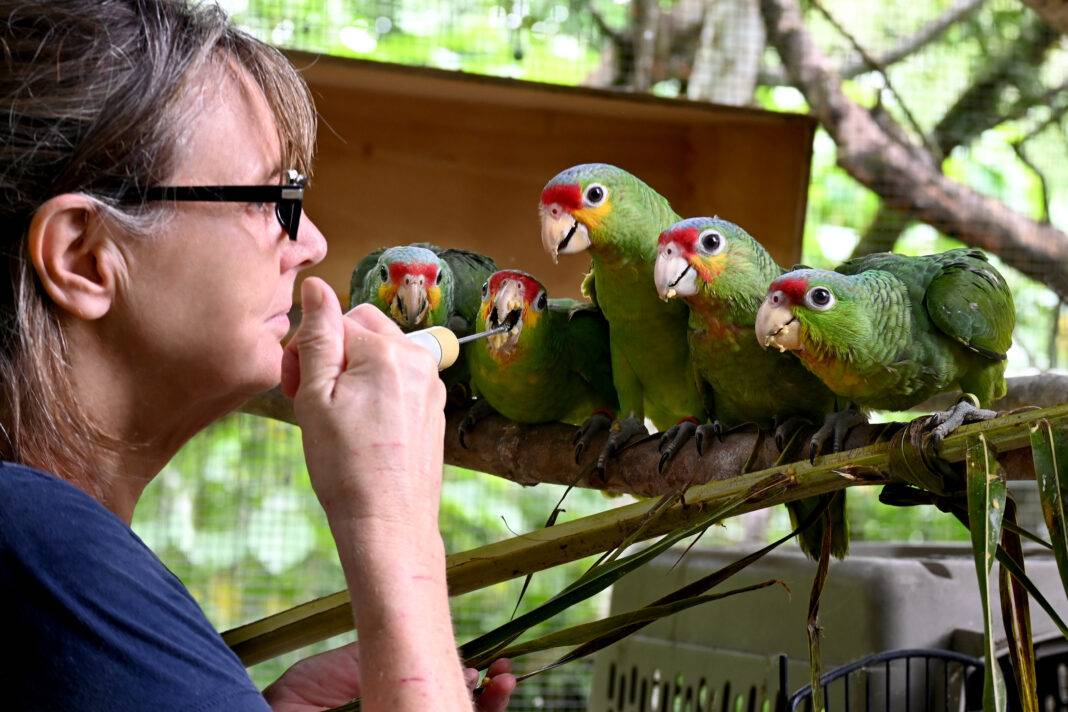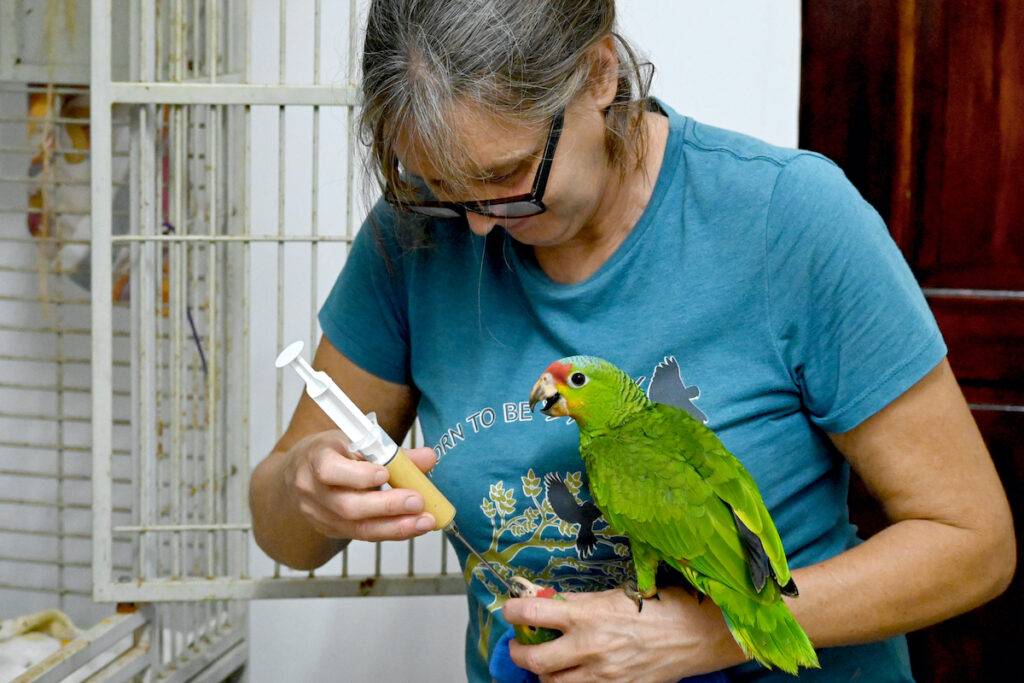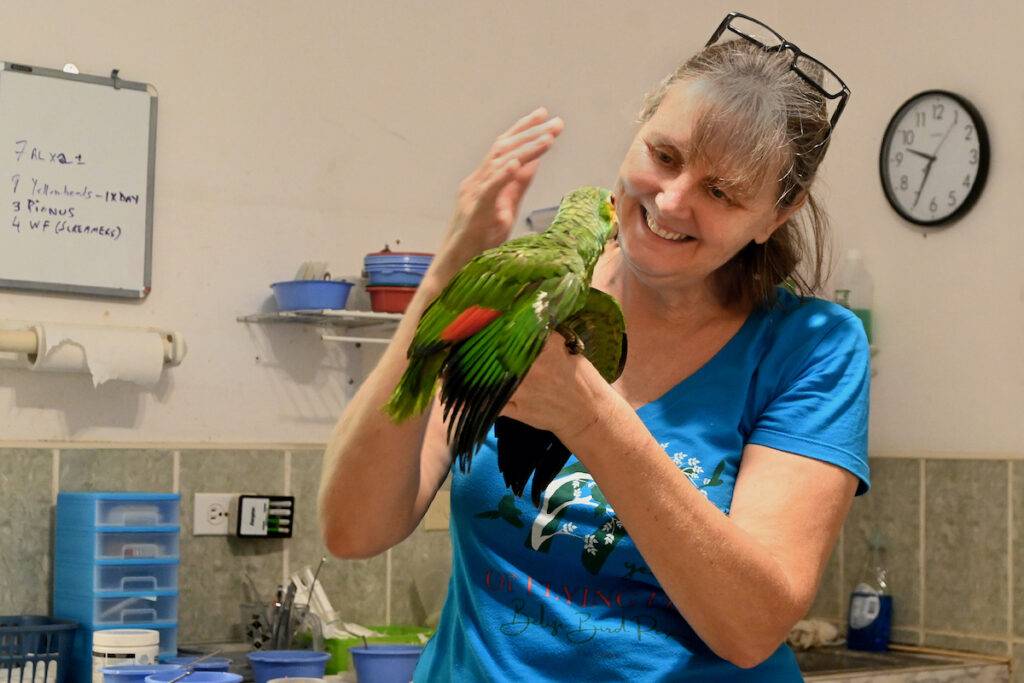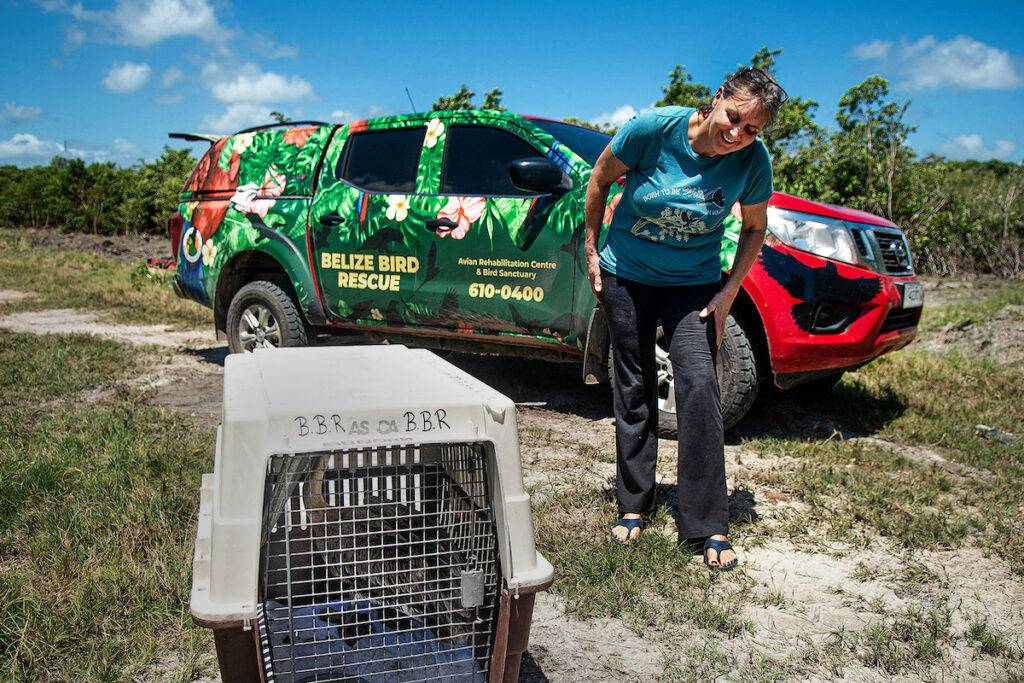Nikki Buxton built a rescue organization to protect birds from wildlife trafficking.
It was 2004, and Nikki Buxton and her partner had just begun work on the home they planned to build near a citrus orchard in a lush rainforest in Belize. A boy walked up carrying a big white bucket.
He could have been 8 or 12 — it was hard to tell. He urged them to look in the bucket. Tired, hot, and dirty from work, Nikki said hello, but declined his offer. She’d moved from the U.K. to Belize a year earlier and was accustomed to young children by the roadside selling all sorts of products — breads and cakes their mothers had made. But her partner couldn’t resist, and was soon beckoning Nikki to come see what was in the bucket. She peered in. There were two featherless baby parrots trembling and gazing up at her in terror. Nikki burst into tears.
She had no idea what kind of parrots these were, but she knew they were babies and that they should not be in a plastic bucket on a baking hot, dusty road. The child told her that the parrots had fallen out of a nest. Nikki offered him 50 Belize dollars and begged him to return them to the nest. But the child just kept stretching out the bucket toward her. He calmly explained, shaking his head, that she had to take the birds; he could not return them. She succumbed. She had no idea how she was going to save these baby birds, but she was determined to try. She gave him the money and accepted the bucket.
Although Nikki had no previous experience with birds, she was drawn to these two vulnerable chicks. She knew nothing about the pet trade and believed these birds were unfortunate orphans. She assured herself that with a bit of love and care, these cute babies would grow feathers, fly away, and return to their families in the wild. Instead, one woman in a tiny country that many could not point out on the map found herself on the frontline of a scramble to save one of its endangered species.
Wildlife trafficking generates billions of dollars in revenue and is intrinsically linked with organized crime. Birds are among the most trafficked wildlife, with millions sold into the live pet trade.
Wildlife trafficking threatens animal species worldwide and is one of the most lucrative illicit activities. It is the fourth largest illegal global trade after drugs, humans, and counterfeit items. It generates billions of dollars in revenue and is linked to organized crime. Birds are among the most trafficked wildlife, with millions sold every year into the live pet trade. The demand for birds as exotic pets or for songbird competitions, or for their parts to use as jewelry, in medicine, and in rituals is one of the biggest threats to endangered birds worldwide.
In the early days, with those first two baby parrots, Nicki discovered that the limited information available about rearing wild birds wasn’t reliable. So she focused on finding people who knew something about parrots. The World Parrot Trust and parrot breeders seemed to have the most valuable diet and husbandry knowledge, and she absorbed all the insight they offered.
Everything was difficult at first. No baby bird formula was available in the country, so she had to make it from scratch. Trying to create the best nutritional balance, based upon what she had learned, she developed a mixture that consisted of fresh boiled yellow corn, papaya, bananas, a variety of nuts, and black beans, all blended into a smooth mush. She fed the babies with plastic spoons, unaware that she could potentially choke them by feeding them without the appropriate syringe. Mostly, she learned directly from these highly intelligent birds. They were excellent communicators and turned out to be her best teachers. They thrived and grew, and she was smitten.
Word of her success with those two babies spread quickly, and people with parrots began turning up at her gate. One day a woman showed up with two pet parrots. She’d heard that it was possible for caged birds to fly free once again. She wanted this for her birds, so she brought them to Nikki. She referred to Nikki as “the bird lady,” and it stuck. Others volunteered their help, and Nikki realized she would quickly outgrow her makeshift facility.
When they were four months old, Nikki’s first two baby parrots seemed to want some independence. Their first flights into trees sent everyone into a panic. The baby parrots were confused and scared to be away from their care-givers, but too frightened to try to fly back down — they had not yet perfected their landing skills. It took over a month of people using ladders to rescue the young birds before they finally gained the confidence to fly down on their own. When they were six months old, they started flying farther and staying away overnight. This was a nerve-racking time, but one day, Nikki saw them mingling with a wild flock and knew her job was done.
She still had much more to learn. The Belize Zoo offered some guidance, but most of her education came through trial and error. Early on, Nikki was devastated when she lost one of her birds to predators. In 2005, she began an expansion that could provide for the needs of the birds without placing them in danger.
Along with the influx of birds needing help came an education on wildlife trafficking in Belize. Nikki soon realized that the people turning up on doorsteps with “orphaned” parrots were, in fact, part of the trade and that those babies had been stolen from their nests. The sellers were always children or young men, carrying very young birds in buckets, or any receptacle, with a story of the birds falling out of the nest. They had heard she was a soft touch.
Every year during nesting season, poachers would raid the parrots’ nests and steal the babies, often destroying the nest and sometimes killing the adults. The sophisticated poachers would sell them into the international trafficking trade through Mexico or Guatemala. But most were sold door to door in Belize.
Every year during nesting season, poachers would raid the parrots’ nests and steal the babies, often destroying the nests and sometimes killing the adults. The sophisticated poachers would sell them into the international trafficking trade through Mexico or Guatemala. But most were sold door to door in Belize. People would buy them because they felt sorry for the birds or because they had an empty cage to fill. The buyers typically had no information on a baby parrot’s needs, and the birds lived short, miserable lives. Those that did survive often had deformities caused by a poor diet.
At her facility, Nikki discovered that while individual birds, like her first two babies, could eventually integrate with a flock, she could also create flocks in her aviaries and release them as a group. These birds would have a ready-made family when they left, making their transition quicker and more successful. There are now multiple recorded instances of her flocks reproducing in the wild.
“The scientific community was resistant to the concept of rehabilitating former captive parrots,” Nikki said. But previous attempts had failed, she said, because the birds were not given enough time to lose their deep-rooted habituation. “They were often hard-released without post-release support.” It can take up to seven years for a previously captive parrot to be rewilded, Nikki knew, and her rescue provided the perfect location for soft-release — “and if there was one thing I [have] plenty of, it’s time and patience.”
Nikki also had to overcome more immediate hurdles. While the laws in Belize were very clear — it was illegal to sell or possess native birds — the Belize government had neither the money nor resources to enforce those laws. Wildlife officers wanted to confiscate parrots that were being kept illegally, so, in 2006, Nikki signed a Memorandum of Understanding with the Belize government to take in and rehabilitate parrots and wild birds of all species brought to her. Belize Bird Rescue was official.
In July 2022, I visited Nikki at her bird rescue and rehabilitation center. Her home and the surrounding property are now devoted to her work, most of which continues to be with her beloved parrots. The parrots call and shout from the aviaries where they are being prepared for life in the wild, and they squawk loudly as they fly above, perching on the edges of feeders covered in fresh fruit and nuts, or roosting in trees, preening and socializing. The humidity is oppressive, yet Nikki never seems to tire. Her facility has grown to include a fully equipped veterinary clinic, raptor nurseries, a water bird room with pool, and six parrot flight aviaries. They also have accommodation for interns and a number of off-site release enclosures.
I was surprised when Nikki told me that she’d had no interest in birds prior to receiving those two baby parrots. I asked her what had enthralled her. “I don’t know exactly, but my life changed when those two little green people – and they really were like little green people – started using their legs, climbing on me, and showing their intelligence and personalities. I had to do something.”
With millions of parrots and other wild birds kept as pets, some countries have regulated captive breeding programs to address trafficking. While there is some evidence that captive breeding has helped reduce the trafficking of some species in countries where it occurs, Nikki is not entirely convinced. “Captive breeding in Belize would never work, as it would be impossible to regulate. There would be no way of keeping proper records and proving where the birds originated. In the very few countries with well-regulated captive breeding, it most certainly has reduced the number of wild birds trafficked. The problem is that most of the world does not have that kind of captive breeding going on, but they see the normalization of keeping parrots and other exotic birds and wildlife as pets, and they want them. It’s this demand that fuels the wildlife trafficking for the pet trade, and the demand is enormous.”
Captive breeding has other negative effects, she went on to explain. “I don’t honestly think any bird should be kept in a cage. Parrots, in particular, have very long lives, and now, in places like the US, where they are bred commercially and intensively, thousands have been abandoned, sitting in sanctuaries, spending decades without a proper home or someone to bond with.”
Parrots are vital to the forest ecosystem as seed dispersers. When we talk about conservation and climate change, it is critical to understand the complexity of ecosystems and how the demise of one species can lead to their collapse. Nikki’s program has “revolutionized parrot conservation,” says Jamal Andrewin Bohn, Conservation Program Manager at The Belize Zoo and Tropical Education Centre. Thanks to Nikki’s partnership with the Belize Forest Department, he says, “Belize saw the first substantial nationwide campaign to crack down on illegal possession as well as poor housing conditions of these highly intelligent birds.” What’s more, Nikki and Belize Bird Rescue “have provided a sustained avenue for hundreds of parrots to be fully rehabilitated and put back into the wild, which helps offset the unyielding demand for and removal of individuals for the illegal wildlife trade.” Though parrots are still threatened overall, Bohn says, “their populations have fared much better in Belize, thanks to Nikki and Belize Bird Rescue.”
Nikki’s work has also helped increase the population of one particularly endangered parrot species, the yellow-headed Amazon. Because of her rescuing these birds from trafficking and going through the long, painstaking process of rehabilitating them back into the wild, their population is, anecdotally, steadily increasing. New population surveys are expected to support this and provide more impetus to the vital work that Nikki is doing in Belize.
In 2022 alone, Nikki and her team, including two staff and a number of volunteers and veterinarians, took in 140 parrots. Her average survival rate is 97 percent. While not every bird will be suitable for release, 70 percent of the birds she has taken in and rehabilitated have been released successfully. The others remain at Nikki’s facility, which offers a sanctuary for those birds that can’t be released. The most exciting outcome is that many of these released birds are now reproducing successfully in the wild. Nikki told me that she has noticed that local attitudes towards parrots, and wildlife in general, have changed considerably in the last decade. Increased education and awareness have been among her top priorities. When Belizeans learned that the beautiful parrots they were so used to seeing in the wild were in danger, local support for Nikki’s work grew. There was some resistance to the confiscation of pet birds, but the collaborative effort between Belize Bird Rescue and the Belize Forest Department ensured that they were seen not only as enforcers, but also as protectors of Belize’s natural heritage. Belizeans understood that they had something special.
The poachers, many of whom came from generations of parrot sellers, were now using their skills and knowledge to become birding guides. This work turned out to be more lucrative and less risky, and led to them being invested in protecting the parrots.
Economic benefits soon followed. In 2020, Forbes Magazine listed Belize as one of the top five birding destinations in the world — a boon to local tourism. The poachers, many of whom came from generations of parrot sellers, were now using their skills and knowledge to become birding guides. This work turned out to be more lucrative and less risky, and led to them being invested in protecting the parrots.
With the cooperation of the Belize Forest Department, Belize Bird Rescue has developed a captive wildlife program that involves investigation, enforcement of wildlife laws, confiscation of captive wildlife, rehabilitation, and ultimately, release. No one turns up at Nikki’s gate asking her to buy poached baby parrots these days, and it is rare to see parrots in cages in people’s homes anymore. This little bird rescue and rehab in one of the tiniest nations in the world has become an international model of good practice and an example of what it will take to fight the next potential extinction.
What Can You Do?
- Do not buy baby parrots. If you really believe you can provide a good home for a parrot, contact a parrot rescue specialist in your area.
- If you do have parrots, do not post public photos or videos that might encourage people to buy their own. Cute photos and videos on social media spread to countries where the only source of parrots is through wildlife trafficking.
- Support local, grassroots organizations like Belize Bird Rescue who work to prevent the trafficking of wild parrots. This can be done directly or through the World Parrot Trust.






What an awesome article! Written such that you had to finish the article…..it was soooo interesting! Great job to Colette and Nikki, and all who contribute to this worthy organization! Your girls ROCK! ♥️